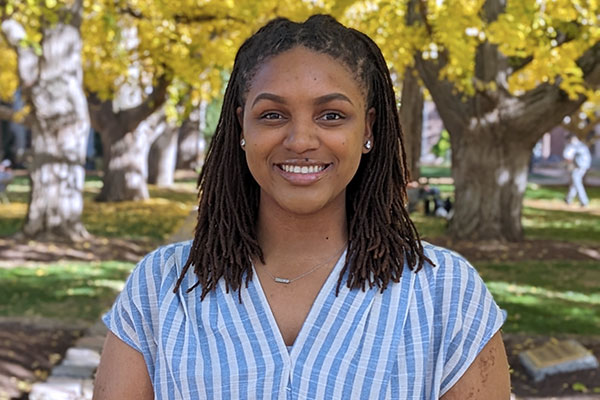Hodges receives geospatial diversity fellowship, Dean’s Select Fellowship
Master’s student Nia Hodges will receive $35,000 annually from the Taylor Geospatial Institute and will continue to a doctoral program next semester

Nia Hodges, a second-year master’s student studying data analytics and statistics in the Preston M. Green Department of Electrical & Systems Engineering at the McKelvey School of Engineering, was recently awarded a Diversity Fellowship Award from the Taylor Geospatial Institute (TGI). The award will provide $35,000 a year for up to four years to fund Hodges’ study and research.
“This fellowship was a perfect fit for me, and I was very confident when applying due to my track record and research interests, as well as what the Taylor Geospatial Institute was looking for,” Hodges said. “It’s a really good opportunity because it allows more people to be in this lab.”
After earning a bachelor’s degree in computer science in 2022 from Jackson State University, Hodges came to McKelvey Engineering on a Department Chair’s Master’s Research Fellowship, a pipeline program designed to encourage students to continue to doctoral programs. She will transition to a doctoral program in systems science & mathematics in Spring 2024 under the Dean's Select Fellowship Program, which offered early admission and a bonus.
“The Chair's Fellowship allowed us to recruit Nia to come to WashU,” said Jim Fehrer, teaching professor of electrical & systems engineering. “She originally was thinking only about a master’s degree, but getting exposure to a research lab allowed her to contemplate what a PhD might be like. The jump to get a PhD is so significant, many well-qualified BS students do not even consider it.”
Hodges said she had planned to get a job after earning a bachelor’s degree, but learning about the Chair’s Fellowship opened her eyes to new opportunities in academia. One of the perks Hodges received as a recipient of the Chair’s Fellowship is the opportunity to meet and work directly with Bruno Sinopoli, chair of electrical & systems engineering.
“I was very hesitant about pursing a PhD because I don’t have immediate family who have ever done that,” Hodges said. “However, last semester, I went to lunch with the chair of the electrical & systems engineering department, and he explained why systems would be a good fit for me as I like working with ‘big picture’ things.
While systems engineering and geospatial studies lie outside of Hodges original area of study, Feher said she’s has been open to expanding her horizons beyond her comfort zone.
“She started in the master’s degree in data analytics & statistics and is seeking to pursue a PhD in systems science & mathematics, which is further afield from computer science, yet she is eager to learn the new material,” Feher said. "She wants to understand the concepts at the foundational level and is ready to do what it takes to make that happen."
The TGI is a research collaboration that unites eight institutions within the Midwest, including Washington University in St. Louis, to advance geospatial technology. Hodges is a graduate researcher in the lab of Nathan Jacobs, professor of computer science & engineering, where she researches computer vision techniques.
“I have a lot of interest in urban resilience and smart cities,” Hodges said. “Cyberphysical systems is where all this makes sense to me, and being able to connect lab work to what I'm interested in is important for me. It's easy for me to dream big and want to make all these improvements, but I have to find something practical that I can do right now.”
Click on the topics below for more stories in those areas
- Diversity
- Graduate Students
- Women & Engineering
- Electrical & Systems Engineering
- Computer Science & Engineering





